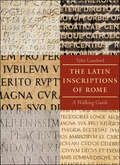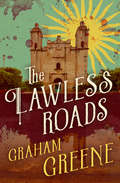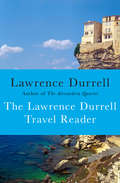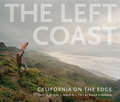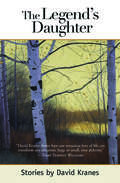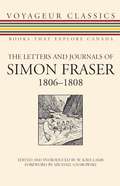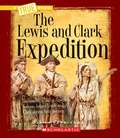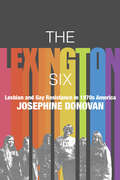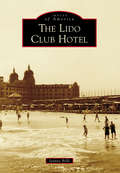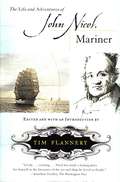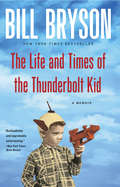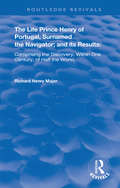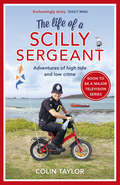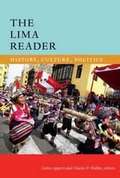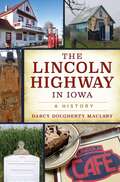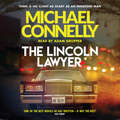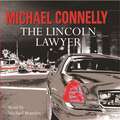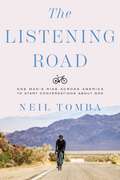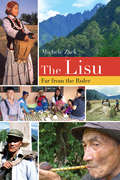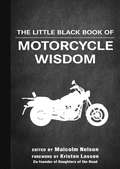- Table View
- List View
The Latin Inscriptions of Rome: A Walking Guide
by Tyler LansfordA collection of 15 guided walking tours of the ancient Latin descriptions found throughout Rome. Rome&’s oldest known Latin inscription dates from the sixth century BC; the most recent major specimen was mounted in 2006—a span of more than two and a half millennia. Remarkably, many of these inscriptions are still to be found in situ, on the walls, gates, temples, obelisks, bridges, fountains, and churches of the city. Classicist Tyler Lansford has collected some 400 of these inscriptions and arranged them—with English translations—into fifteen walking tours that trace the physical and historical contours of the city. Each itinerary is prefaced by an in-depth introduction that provides a survey of the history and topography of the relevant area of the city. The Latin texts appear on the left-hand page with English translations on the right. The original texts are equipped with full linguistic annotation, and the translations are supplemented with historical and cultural notes that explain who mounted them and why. This unique guide will prove a fascinating and illuminating companion for both sophisticated visitors to the Eternal City and armchair travelers seeking a novel perspective into Rome's rich history.&“This book is wonderful. . . . Lansford&’s evocative depictions of monuments, cityscape, and memorable humans have inspired me anew with the fascination of Rome.&” —Mary T. Boatwright, Duke University&“If this book is not slipped into many a Rome-bound suitcase, there is no justice in the world. I can think of few more enjoyable companions on a prowl through the city.&” —Jane Stevenson, Times Literary Supplement (UK)
The Lawless Roads: Journey Without Maps And The Lawless Roads (Penguin Twentieth Century Classics)
by Graham GreeneThis eyewitness account of religious and political persecution in 1930s Mexico inspired the British novelist&’s &“masterpiece,&” The Power and the Glory (John Updike). In 1938, Graham Greene, a burgeoning convert to Roman Catholicism, was commissioned to expose the anticlerical purges in Mexico by President Plutarco Elías Calles. Churches had been destroyed, peasants held secret masses in their homes, religious icons were banned, and priests disappeared. Traveling under the growing clouds of fascism, Greene was anxious to see for himself the effect it had on the people—what he found was a combination of despair, resignation, and fierce resilience. Journeying through the rugged and remote terrain of Chiapas and Tabasco, Greene&’s emotional, gut response to the landscape, the sights and sounds, the fears, the oppressive heat, and the state of mind under &“the fiercest persecution of religion anywhere since the reign of Elizabeth&” makes for a vivid and candid account, and stands alone as a &“singularly beautiful travel book&” (New Statesman). Hailed by William Golding as &“the ultimate chronicler of twentieth-century man&’s consciousness and anxiety,&” Greene would draw on the experiences of The Lawless Roads for one of his greatest novels, The Power and the Glory.
The Lawrence Durrell Travel Reader
by Lawrence DurrellA collection of travel essays from the bestselling author whose writing sparkles with &“prose as luminous as the Mediterranean air he loves&” (Time). Few men have traveled as wisely as Lawrence Durrell. Born in India, he lived in Corfu as a young man, enjoying salt air, cobalt water, and an unfettered bohemian lifestyle. Over the following decades, he rambled around the Mediterranean, making homes in Egypt, Cyprus, and Greece. Each time he moved, he asked himself why he felt compelled to travel. In this book, he gives his answer. Durrell knew that the wise traveler looks not for pleasure, education, or landmarks, but is hungry for a sense of place—the element of a landscape, city, or nation that makes its people who they are. In this anthology, passages from Durrell&’s classic Mediterranean writings are paired with observations on other lands. His writing is poetic, lush, and achingly clear, for this was a man who truly saw the world.
The Left Coast: California on the Edge
by Philip L. Fradkin Alex L. FradkinPhilip L. Fradkin, one of California's most acclaimed environmental historians, felt drawn to the coast as soon as he arrived in California in 1960. His first book, California: The Golden Coast, captured the wonder of the shoreline's natural beauty along with the controversies it engendered. In The Left Coast, the author and his photographer son Alex Fradkin revisit some of the same places they explored together in the early 1970s. From their written and visual approaches, this father-son team brings a unique generational perspective to the subject. Mixing history, geography, interviews, personal experiences, and photographs, they find a wealth of stories and memorable sights in the multiplicity of landscapes, defined by them as the Wild, Agricultural, Residential, Tourist, Recreational, Industrial, Military, and Political coasts. Alex Fradkin's expressive photographs add a layer of meaning, enriching the subject with their distinctive eloquence while bringing a visual dimension to his father's words. In this way, the book becomes the story of a close relationship within a probing study of a varied and contested coastline.
The Legend's Daughter
by David KranesA 15 Bytes 2014 Book Award Winner"In this exceptional collection of stories set mostly in Idaho in the deep backwoods along river banks and lonely county roads, Kranes' characters are all thrown out of their comfort zones. And so is the reader. Richly drawn and complex, these stories challenge the intellect. Kranes has managed to somehow dam the river of souls these stories possess. They do not lie still, however, between the covers but rather spin in far-reaching whirlpools of genuine humanity and mortality."-15 Bytes"There's something to be said about a writer whose style is easily recognized, whose voice stands out, whose stories are readily identified. What's remarkable about David Kranes's writing and these stories, though, is that each story stands out on its own merit, while every story is well crafted and conceived. Nothing one-dimensional about his people, nothing one dimensional about his prose, either."-ForeWord Reviews"From rainbow trout jumping in the Salmon River to watering holes on the edge of McCall Lake, each of the ten stories in author and playwright David Kranes's The Legend's Daughter transports the reader to the wilderness of Eastern Idaho. While Kranes renders a common setting in each story, the collection is not simply a detailed portrait of Idaho, but an examination of the lives of restless people seeking to escape from their lives and find peace."-ZYZZYVA"The Legend's Daughter is a story collection of real people struggling with identity, with love, with time, rooted in the rugged and indifferent beauty of Idaho where each character finds his or her mirror in water, in stone, in place. David Kranes shows how our tenacious love of life can transform any situation, large or small, into alchemy. We are all living inside these raw and well-drawn pages."-Terry Tempest Williams, author of When Women Were Birds"These Idaho stories are vintage David Kranes. He, more than any other writer, is the one whose work spurs me to reconsider what fiction can do. He uses language like a knife and the worlds in his stories come off the page at me. We haven't seen this Idaho before. I'm thrilled to have these stories, every one of them provocative, riveting, and robust."-Ron Carlson, author of The Signal"In these times of disconnection, David Kranes lassoes us with the delicate tether of his multiple gifts and brings us home . . . a storyteller and an elegant craftsman."-Mary Sojourner"David Kranes has given us ten stories, entirely various, often splendid, sometimes hilarious or heartbreaking."-William Kittredge, author of The Willow Field
The Letters and Journals of Simon Fraser, 1806-1808
by W. Kaye Lamb Michael GnarowskiB.C. journalist Stephen Hume has said that fur trader and explorer Simon Fraser should be celebrated as the founder of British Columbia. Certainly, the achievements of the Scottish-descended United Empire Loyalist adventurer were impressive. During three extraordinary years, 1805-1808, Fraser undertook the third major expedition (after Alexander Mackenzie’s and Lewis and Clark’s) across North America, culminating in his famous journey down the river in British Columbia that now bears his name. Employed by the Montreal-based North West Company, Fraser was responsible for building many of British Columbia’s first trading posts. His exploratory efforts helped lead to Canada’s boundary later being declared at the 49th parallel. In this new volume, librarian and archivist W. Kaye Lamb provides a detailed introduction as well as illuminating annotations to Fraser’s journals, which were originally published by Macmillan of Canada in 1960.
The Lewis And Clark Expedition (True Books: Westward Expansion)
by John PerritanoComprehensive text about the Lewis and Clark expedition in the Louisiana territory in preparation for the Louisiana Purchase.
The Lexington Six: Lesbian and Gay Resistance in 1970s America
by Josephine DonovanOn September 23, 1970, a group of antiwar activists staged a robbery at a bank in Massachusetts, during which a police officer was killed. While the three men who participated in the robbery were soon apprehended, two women escaped and became fugitives on the FBI's Ten Most Wanted list, eventually landing in a lesbian collective in Lexington, Kentucky, during the summer of 1974. In pursuit, the FBI launched a massive dragnet. Five lesbian women and one gay man ended up in jail for refusing to cooperate with federal officials, whom they saw as invading their lives and community. Dubbed the Lexington Six, the group's resistance attracted national attention, inspiring a nationwide movement in other minority communities. Like the iconic Stonewall demonstrations, this gripping story of spirited defiance has special resonance in today's America. Drawing on transcripts of the judicial hearings, contemporaneous newspaper accounts, hundreds of pages of FBI files released to the author under the Freedom of Information Act, and interviews with many of the participants, Josephine Donovan reconstructs this fascinating, untold story. The Lexington Six is a vital addition to LGBTQ, feminist, and radical American history.
The Lido Club Hotel (Images of America)
by Joanne BelliThe Lido Club Hotel officially opened in June 1928 as a swanky oceanfront resort adjacent to the world-class Lido Golf Course. Built by Sen. William H. Reynolds, who previously bought and developed nearby Long Beach, the Lido Club Hotel featured a striking architectural design with twin cupolas and became a playground for socialites, industrialists, and politicians. In 1942, the US Navy requisitioned the hotel as a naval training and separation center. After the war, the Lido Club Hotel was leased to the newly formed United Nations and housed over 500 of its personnel. The hotel returned to civilian hands in 1947 and was once again a fashionable seaside resort with a wealthy clientele. Over the next 30 years, many well-known entertainers such as Sammy Davis Jr. and Barbra Streisand performed in Lido's Starlight Room. In 1980, the Lido Club Hotel was sold to developers and converted into a luxury oceanfront condominium, Lido Beach Towers, that remains a local landmark with a fascinating past.
The Lie
by Mike Mitchell Petra HammesfahrNadia and Susanne look uncannily alike, but one of the women is seriously rich and the other is destitute. When Nadia asks Susanne to spend the weekend with her husband so that she can sneak off with a lover, how can Susanne refuse the outrageous payment on offer? Nadia and her husband barely speak to each other and he will be working most of the weekend. Easy money, or so it seems.One Friday afternoon Susanne drives Nadia's Alfa to her beautiful suburban villa with its indoor pool and glass doors opening onto the sloping lawn. This first stay is followed by others, as an apparently harmless game becomes a deadly web of lies.Petra Hammesfahr, born in 1951, has not had an easy life: she left school at thirteen and became pregnant by an alcoholic husband at seventeen. She published her first novel when she was forty and has since written over twenty crime and suspense novels. Petra also writes scripts for television and film. She has won numerous literary prizes, including the Crime Prize of Wiesbaden and the Rhineland Literary Prize.
The Lieutenant Nun: Annotated Translation of the Play, Historical Accounts and Documents about Antonio/Catalina de Erauso (New Interdisciplinary Approaches to Early Modern Culture)
by Sherry Velasco Simone Chess Sawyer K. KempThis volume contains the English translation of the seventeenth-century literary and archival materials about a Basque person who died under the name Antonio de Erauso (b. ~1580, d. 1650), bringing readers closer to an individual who could be considered a trans ancestor.Born into a noble family in San Sebastian, Spain, as Catalina de Erauso, Erauso lived most of their life as a man, serving as a soldier in Peru and Chile, and working as a muleteer in Mexico until their death in 1650. This book provides – for the first time – an English translation of texts related to Erauso: the contemporary play Famosa comedia de la monja alférez (The Famous Play of the Lieutenant Nun), contemporary Accounts (Relaciones) about Erauso, selected archival documents about Erauso’s Petition for a Pension to the Council of the Indies, and contemporary letters mentioning Erauso.This book presents early modern scholars working in English with new material essential to understanding the historical and literary figure of Erauso, and historical documentation that provides a glimpse into the terms Erauso (and others) seemingly chose for themselves.
The Life and Adventures of John Nicol, Mariner
by Tim FlanneryAn international bestseller, The Life and Adventures of John Nicol, Mariner is a rousing memoir of an ordinary man's extraordinary life, a gripping true adventure tale. In his many voyages, the Scottish-born sailor John Nicol (1755-1825) twice circumnavigated the globe, visiting every inhabited continent while participating in many of the greatest events of exploration and adventure of the eighteenth century. During his career Nicol battled pirates, traded with Native Americans, and fought for the British Navy in the American and French revolutions. In Hawaii, he was entertained by the King's court mere days after the murder of Captain James Cook. In Jamaica, he saw firsthand the horrors of the slave system and befriended slaves who invited him to join in their dance celebrations. En route to Australia, he would meet the love of his life, Sarah Whidam, a convict bound for the Botany Bay prison colony, who would bear his son before duty forced them apart forever.
The Life and Times of the Thunderbolt Kid: A Memoir
by Bill BrysonThere are many theories as to how the Thunderbolt Kid came to attain his fantastic powers, and turned the world into a dangerous place for morons. Some say that the first hints that Bill Bryson was not of Planet Earth came from his discovery, at the age of six, of a woollen jersey of rare fineness. Across the moth-holed chest was a golden thunderbolt. It may have looked like an old college football sweater, but young Bryson knew better. It was obviously the Sacred Jersey of Zap, and proved that he had been placed with this innocuous family in the middle of America to fly, become invisible, shoot guns out of people's hands from a distance, and wear his underpants over his jeans in the manner of Superman. Bill Bryson's first travel book opened with the immortal line, 'I come from Des Moines. Somebody had to.' In this hilarious new memoir, he travels back to explore the kid he once was and the weird and wonderful world of 1950s America. He modestly claims that this is a book about not very much: about being small and getting much larger slowly. But, for the rest of us, it is a laugh-out-loud book that will speak volumes - especially to anyone who has ever been young. Praise for Bill Bryson: * 'Hugely funny (not snigger-snigger funny, but great-big-belly-laugh-till-you-cry funny). ' - Daily Telegraph.
The Life of Prince Henry of Portugal: Surnamed the Nabigator and its Results (Routledge Revivals)
by Richard Henry MajorOriginally published in 1868, this book follows the life of Prince Henry, including chapters on the Siege of Tangier, the capture of Ceuta and the death of Prince Henry.
The Life of a Scilly Sergeant
by Colin Taylor‘Policing is like this everywhere but not everywhere is Scilly’Meet Sergeant Colin Taylor, he has been a valuable member of the police force for over 20 years, 5 of which have been spent policing the ‘quiet’ Isles of Scilly, a group of islands off the southwestern tip of the Cornish peninsula. Colin has made it his purpose to keep the streets of Scilly free from drunk anchor thieves, Balance Board riders and other culprits, mostly drunken, intent on breaking the law. This book is the first hand account of how he did it.Coupled with his increasingly popular ‘Isle of Scilly Police Force’ Facebook page, this book charts the day to day trials and tribulations of a small-island police officer, told in a perfectly humorous and affectionate way. This book is a fantastic read and Colin's antics are soon to be the feautre of a major ITV TV series.
The Lima Reader: History, Culture, Politics
by Carlos Aguirre Charles F. WalkerCovering more than five hundred years of history, culture, and politics, The Lima Reader captures the multiple viewpoints of the diverse peoples of Peru’s capital city. The volume traces Lima’s transformation from a pre-Columbian religious center, to the colonial “City of Kings,” to today's vibrant and deeply divided metropolis of almost ten million people. A rich array of primary sources—including traveler accounts, essays, photographs, maps, poems, short stories, lyrics, and memoir excerpts, many appearing in English for the first time—address how Lima’s multiethnic population, class inequalities, and debates of who is a “true” limeño/a have evolved throughout the city’s history. The book also includes selections that explore Lima’s identity through its food, sports culture, festivals, and sense of humor. Intended for travelers, students, and scholars alike, The Lima Reader is an invaluable introduction to the complex social tensions and cultural history of Lima and its people.
The Lincoln Highway in Iowa: A History (Transportation)
by Darcy Dougherty MaulsbyIowa's Great Highway Before there was Route 66, there was the iconic Lincoln Highway. A symbol of limitless potential, America's first coast-to-coast highway spanned Iowa from the Mississippi River to the Missouri River. When you travel U.S. 30 across Iowa today, you're never far from the historic Lincoln Highway, if not right on top of it. Learn the history of an Iowa landmark.
The Lincoln Lawyer: A Richard and Judy bestseller (Mickey Haller Series #1)
by Michael ConnellyThere is no client as scary as an innocent man...Mickey is a Lincoln Lawyer - a criminal defence attorney operating out of the back of his car, a Lincoln - taking whatever cases the system throws at him. He's been a defence lawyer for a long time, and he knows just how to work the legal system. When a Beverly Hills rich boy is arrested for brutally beating a woman, Haller gets his first high-paying client in years. The evidence mounts on the defence's side, and Haller might even be in the rare position of defending a client who is actually innocent.But then the case starts to fall apart. And neither the suspect nor the victim are quite who they seem, and Haller quickly discovers that when you swim with the sharks, you might just end up as prey...
The Lincoln Lawyer: A Richard and Judy bestseller (Mickey Haller Series #1)
by Michael ConnellyA major motion picture starring Matthew McConaughey. There is no client as scary as an innocent man. From the bestselling author of THE GODS OF GUILT and BRASS VERDICT comes the first in the Mickey Haller legal thrillers. Mickey is a Lincoln Lawyer, a criminal defence attorney who operates out of the back of his car, a Lincoln, taking whatever cases the system throws in his path. He's been a defence lawyer for a long time, and he knows just how to work the legal systems. When a Beverly Hills rich boy is arrested for brutally beating a woman, Haller has his first high-paying client in years. The evidence mounts on the defence's side, and Haller might even be in the rare position of defending a client who is actually innocent.But then the case starts to fall apart, neither the suspect nor the victim are quite who they seem - and Haller quickly discovers that when you swim with the sharks, it's easy to wind up as prey.
The Lincoln Lawyer: A Richard and Judy bestseller (Mickey Haller Series #1)
by Michael ConnellyA major motion picture starring Matthew McConaughey. There is no client as scary as an innocent man. From the bestselling author of THE GODS OF GUILT and BRASS VERDICT comes the first in the Mickey Haller legal thrillers. Mickey is a Lincoln Lawyer, a criminal defence attorney who operates out of the back of his car, a Lincoln, taking whatever cases the system throws in his path. He's been a defence lawyer for a long time, and he knows just how to work the legal systems. When a Beverly Hills rich boy is arrested for brutally beating a woman, Haller has his first high-paying client in years. The evidence mounts on the defence's side, and Haller might even be in the rare position of defending a client who is actually innocent.But then the case starts to fall apart, neither the suspect nor the victim are quite who they seem - and Haller quickly discovers that when you swim with the sharks, it's easy to wind up as prey.Read by Michael Brandon(p) 2005 Orion Publishing Group
The Listening Road: One Man's Ride Across America to Start Conversations About God
by Neil TombaIn today&’s contentious social climate, is it possible to talk to people—whether strangers or friends—about life&’s deepest and most sensitive topics? In The Listening Road, you&’ll ride along on one man's remarkable 33-day journey cycling across the United States on a mission to engage with people from all walks of life in real conversations about things that matter most.As a pastor, Neil Tomba noticed a disturbing trend among people in church: they were finding it increasingly difficult to talk about God to those outside of the church. Neil wanted to practice what he preached, so he set out to bike across the United States, talking—and, more importantly, listening—to strangers from all walks of life about faith, their stories, and matters of the heart.The Listening Road takes you on Neil&’s remarkable journey across the country and straight into its soul—from Route 66 motels to state parks, a lake house, and a railway car; from conversations with Amish farmers to chats with truckers, cowboys, mechanics, and a descendant of Daniel Boone. From one city, farm, and highway to the next, we discoverpractical ways to change our posture toward others to foster conversation,why curiosity, kindness, and respect open up communication about God, andhow even in a culture of division and antagonism, real connection is possible.In our polarizing time, Neil models with compassion and curiosity that genuine connection happens if only we are willing to listen in love.
The Lisu: Far from the Ruler
by Michele ZackThis book brings the ironic worldview of the Lisu to life through vivid, often amusing accounts of individuals, communities, regions, and practices. One of the smallest and last groups of stateless people, and the most egalitarian of all Southeast Asian highland minorities, the Lisu have not only survived extremes at the crossroads of civil wars, the drug trade, and state-sponsored oppression but adapted to modern politics and technology without losing their identity. The Lisu weaves a lively narrative that condenses humanity’s transition from border-free tribal groupings into today’s nation-states and global market economy. Journalist and historian Michele Zack first encountered the Lisu in the 1980s and conducted research and fieldwork among them in the 1990s. In 2014 she again traveled extensively in tribal areas of Thailand, Myanmar, and China, when she documented the transformative changes of globalization. Some Lisu have adopted successful new urban occupations in business and politics, while most continue to live as agriculturists “far from the ruler.” The cohesiveness of Lisu culture has always been mysterious—they reject hierarchical political organization and traditionally had no writing system—yet their culture provides a particular skillset that has helped them navigate the terrain of the different religious and political systems they have recently joined. They’ve made the transition from living in lawless, self-governing highland peripheries to becoming residents and citizens of nation-states in a single generation. Ambitious and written with journalist’s eye for detail and storytelling, The Lisu introduces the unique and fascinating culture of this small Southeast Asian minority. Their path to national and global citizenship illustrates the trade-offs all modern people have made, and their egalitarian culture provides insight into current political choices in a world turning toward authoritarianism.
The Little Black Book of Motorcycle Wisdom (Little Red Books)
by Malcolm NelsonThere’s no getting around the allure of motorcycles. Since 1885, when Gottlieb Daimler mounted a gas-powered engine on a wooden bicycle, riders of all ages have been drawn to the exhilaration and terror of motoring in the open air on two wheels. Motorcycles have become ingrained in our culture. To some, they are the ultimate expression of freedom. To others, motorcycles symbolize lawlessness and disrespect for authority.The Little Black Book of Motorcycle Wisdom is packed full of wise, witty, and edgy quotes on motorcycles and the people who ride them. Celebrities, literary giants, and athletes offer pithy and memorable comments on what they ride, where they ride, with whom they ride, how fast they ride—and, most importantly, why they ride. Read musings on bikes from such noteworthy folks as: Hunter S. ThompsonMarlon BrandoRobert PirsigEvel KnievelSonny BargerEwan McGregorSteve McQueenLeonardo DiCaprioPaul NewmanBob DylanHugh LaurieAngelina JolieT. E. LawrenceAnd dozens of others!There’s a reason why people the world over are passionate about a machine that has been dubbed “the perfect vehicle.” This book tells you why.
